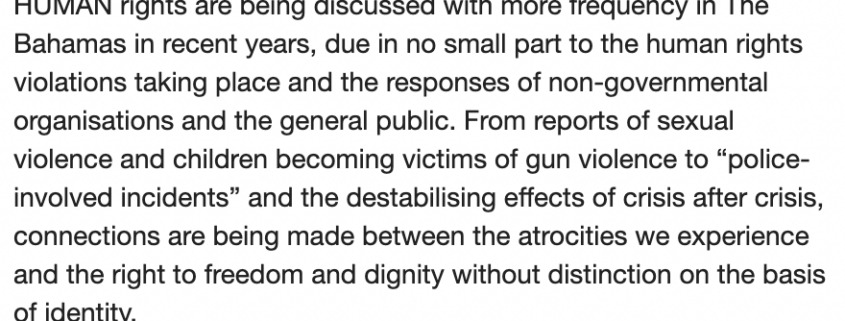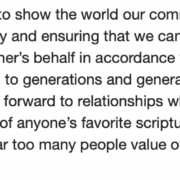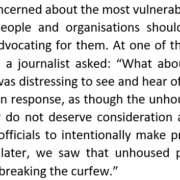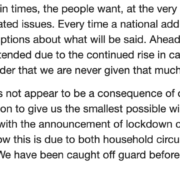Human rights are being discussed with more frequency in The Bahamas in recent years, due in no small part to the human rights violations taking place and the responses of non-governmental organisations and the general public. From reports of sexual violence and children becoming victims of gun violence to “police-involved incidents” and the destabilising effects of crisis after crisis, connections are being made between the atrocities we experience and the right to freedom and dignity without distinction on the basis of identity.
The Universal Declaration of Human Rights was published in 1948, has been translated into over 500 languages, and is the foundation of dozens of human rights treaties. In Article 2, it is clearly stated that everyone is entitled to the rights and freedoms set out in the Declaration. These include life, liberty, and security of person, recognition as a person before the law, equal protection of the law, freedom of movement, nationality, to work, and to education.
Human rights treaties build and expand on the human rights articulated in the Universal Declaration of Human Rights, making them specific to particular groups of people who are frequently excluded and/or marginalised and who have/had experiences that make their ability access to human rights more difficult. The Convention on the Elimination of All Forms of Discrimination Against Women (CEDAW) — perhaps the most widely referenced human rights treaty referenced in The Bahamas — is an example of this as it built and continues to build on the Universal Declaration of Human Rights to specifically articulate the rights of women and the obligation of States to promote, uphold, and expand them.
Take, for example, Article 16 of the Universal Declaration of Human Rights which is on marriage. It has three parts. The first part says, “Men and women of full age, without any limitation due to race, nationality or religion, have the right to marry and to found a family. They are entitled to equal rights as to marriage, during marriage and at its dissolution.” The second part says it is only entered into with full consent of both parties. The third part says “the family is the natural and fundamental group unit of society[…]” Article 16 of CEDAW is on marriage, and it has two parts with the first part having eight subsections. The Article focuses on eliminating discrimination against women in marriage and family relations. As such, one of the subsections affirms that women and men have “the same rights and responsibilities as parents[…]. Another states that women and men have “the same personal rights as husband and wife, including the right to choose a family name, a profession and an occupation”. While these rights could be assumed upon reading and understanding of the Universal Declaration of Human Rights, the human rights treaty specific to (eliminating discrimination against) women states them clearly. Other human rights treaties serve a similar function, putting human rights into the context of particular people and situations.
The Bahamas has ratified nine United Nations human rights treaties. These include the Convention of the Rights of the Child, International Covenant on Civil and Political Rights, International Covenant on Economic, Social and Cultural Rights, Convention on the Rights of Persons with Disabilities. The most recent is the Convention against Torture and Other Cruel Inhuman or Degrading Treatment of Punishment, ratified in May 2018, closely following the third cycle of the Universal Periodic Review during which several UN member states — including Italy, France, Sierra Leone, and Indonesia —recommended The Bahamas ratify it.
Ratification of human rights treaties is agreement with the content, acknowledgement of the State obligation to take specific actions to promote, protect, and provide access to human rights, and a commitment to take those actions. This is not limited to United Nations mechanisms, but includes regional agreements and those by other multilateral organizations such as the International Labour Organization (ILO). For example, The Bahamas ratified Convention 190 (C190) on the Elimination of Violence and Harassment in the World of Work on November 25, 2022, International Day for the Elimination of Violence Against Women — the first day of the Global 16 Days Campaign, also known as 16 Days of Activism Against Gender-Based Violence.
Many human rights treaties have committees of independent experts which are responsible for reviewing State reports and submissions from other stakeholders, posing questions, and facilitating constructive dialogues with States about their progress toward full compliance with the related treaties. One process that works differently is the Universal Periodic Review (UPR). It does not have a committee of experts. Instead, it is a peer review in which United Nations Member States review one another. Another unique element is that the UPR is attentive to other human rights treaties and State ratification of and compliance with them.
On Wednesday, May 3, The Bahamas was under review at the 43rd Session of the Universal Periodic Review (UPR) at the United Nations in Geneva. This was part of the fourth cycle of reviews. The Bahamas submitted a written report and the Attorney General made a statement before the United Nations Member States. This was followed by 90-second contributions by Member States which includes commendations on the progress made up to that point and recommendations for The Bahamas to act on before its review in the fifth cycle, approximately five years later.
The Bahamas failed to take action on most of the recommendations made at its third cycle review. The Bahamas has not ratified the International Convention on the Protection of the Rights of all migrant workers and members of their families. The Bahamas has not ratified the Optional Protocol to the same Convention. It has failed to establish the Office of the Ombudsman in accordance with the Paris Principles, and it has failed to establish a national human rights institution (NHRI) in accordance with the Paris Principles. Several Member States called for the criminalisation of marital rape, implementation of the Strategic Plan to Address Gender-Based Violence, comprehensive anti-discrimination legislation to protect the human rights of all, including LGBTQI+ people, amendments to the Bahamas Nationality Act for gender-equal nationality rights, and abolition of the death penalty.
Several countries expressed concern regarding human trafficking and recommended that The Bahamas provide training to law enforcement and judges to improve identification of trafficking victims, provide support to trafficking victims, provide financing for prevention of trafficking, and improve its coordination with non-governmental organisations and government departments to prevent trafficking. Recommendations related to trafficking were repeated in the fourth cycle review.
The Bahamas did, as previously mentioned, act on the recommendation to ratify the Convention against Torture and Other Cruel, Inhuman or Degrading Treatment or Punishment (CAT), a recommendation repeated from the second cycle review.
In his address, the Attorney General, of course, highlighted even the smallest steps taken toward recommendations. He noted that the death penalty had not been carried out for many years and that there is no plan for a formal moratorium on the death penalty. He claimed there is a systemic approach to protecting the rights of children, that corporal punishment is not recommended in schools and that the last school administrators who used it was put on administrative leave, and that the Department of Social Services has a parent training program that includes information on different forms of discipline. Rather than admitting that The Bahamas has failed to establish a National Human Rights Institution, he talked about the Ombudsman Bill—tabled one week before the review, obviously for this purpose—and the laughable Parliamentary Committee on Human Rights, also introduced the week before, which is far from a National Human Rights Institution and does not come close to meeting the Paris Principles.
At the 43rd Session of the Universal Periodic Review last week, United Nations Member States repeated many of the same recommendations from 2018. There were also new recommendations, and recommendations that were repeated with more specificity. The recommendations included amendments to nationality law for women to pass on citizenship to their children and spouses, implementation of the Strategic Plan to Address Gender-Based Violence, criminalisation of marital rape, amendment of the definition of “discrimination” in Article 16 of the constitution, establishment of a National Human Rights Institution, ratification of various human rights treaties including the Convention on the Rights of All Migrant Workers and Members of Their Families, discriminatory law review and reform with support from UN Women (which is in progress and we await the final report from UN Women Caribbean Multi-Country Office which is significantly delayed), improvement of prison and detention center conditions, inclusion of climate justice in civics curriculum, and elimination of discriminatory stereotypes against women and girls.
The report on the Universal Periodic Review of The Bahamas in the fourth cycle will be made available on the Office of the United Nations High Commissioner for Human Rights website this month. It will not only have the recommendations made to The Bahamas, organized by thematic area, but will have the response of the government. States can support (interpreted as accept) or note (interpreted as reject) recommendations. It is important to know the international human rights standards, how The Bahamas does or does not meet them, and how the government responds to the recommendations aimed at compliance with the international mechanisms with which it has chosen to participate. Recent news stories on the UPR process have chosen specific points to highlight for various reasons, obviously linked to the market for news, so it is especially important for those with interest in human rights to seek out, read, understand, and share complete information. Knowing our rights is critical, as is knowing the government’s perception of and response to its obligations. With this information, we are better equipped to make our demands and realise all of our human rights.
Published in The Tribune on May 10, 2023












Leave a Reply
Want to join the discussion?Feel free to contribute!